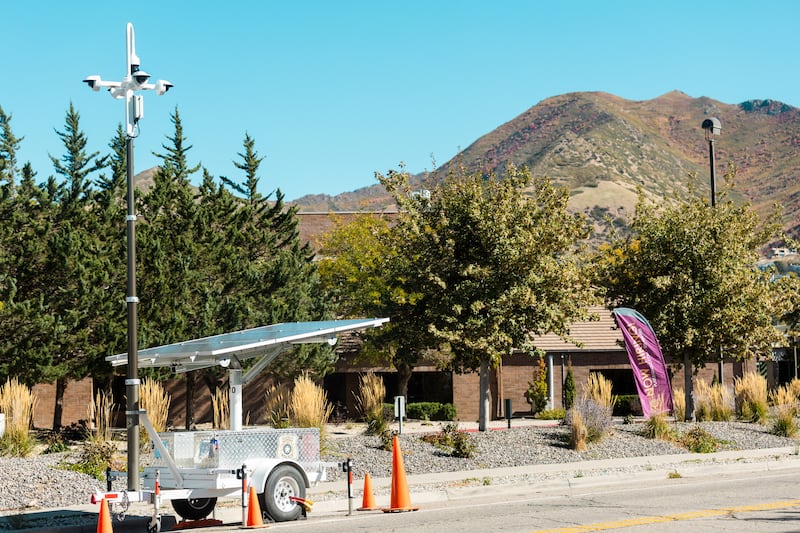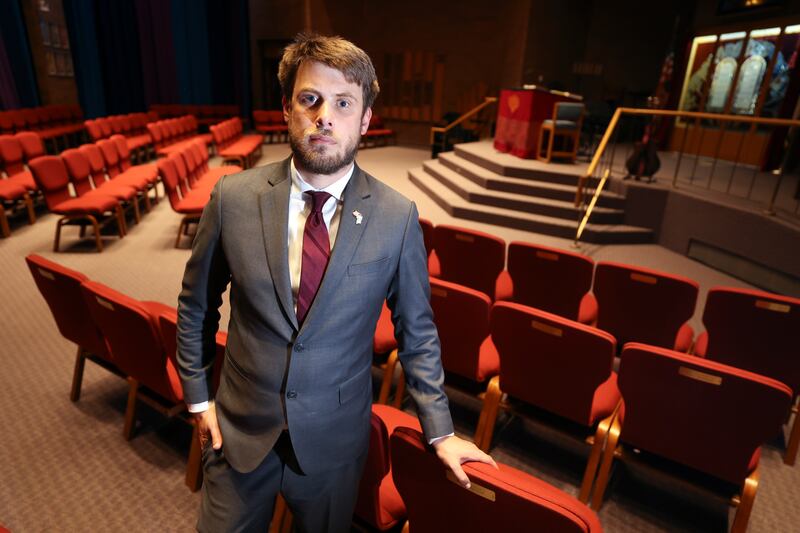The culmination of Simchat Torah, a Jewish holiday that celebrates and marks the conclusion of the annual cycle of public Torah readings, is ordinarily a joyous occasion for Salt Lake City’s Congregation Kol Ami.
But this year, in light of the large-scale terrorist attack by the militant group Hamas on Israel on Saturday, the mood at Sunday morning’s service was solemn.
“This year, because of what happened in Israel, it was already a more somber occasion, less festive than usual. We didn’t feel like celebrating with what occurred. And then this threat came in during the service,” said Rabbi Samuel Spector, referring to an anonymous bomb threat he received by email Sunday morning that forced an evacuation.
The threat was a hoax but it compounded the anguish of Kol Ami’s congregation, already mourning the mass loss of life in Israel resulting from the terrorist attack waged by air, sea and on land. According to The New York Times, some 900 Israelis have been killed, while the Israeli Government Press Office said Monday more than 2,600 have been wounded since the start of the assault on Saturday on its social media pages. Another 150 people have been taken hostage.
“Terrorism is nothing new to Israel, but we’ve never seen anything of this magnitude. While 3,000 people died on 9/11, more than 700 died from the events that took place on Saturday. If you were to look at what Israel’s population is, compared to the United States. proportionally, that would be the equivalent of 24,000 people in America being killed,” said Rabbi Spector.
“So this really is for Israelis, a day that will live in infamy, and their equivalent of 9/11 or Pearl Harbor,” he said.
Rabbi Avremi Zippel of Chabad Lubavitch of Utah said the last few days have been profoundly difficult.
“Sadly our people are no stranger to pain and suffering. The loss of life in Israel has almost become part of our national experience, you’re almost accustomed to it on some level. And yet what’s happened over the past few days has absolutely taken that to the next level,” he said.
“The images of that brutality, the terrorization, the animalistic behavior that we’re seeing in connection with what’s happened in the Middle East shake you to the core, it rattles you. The celebration of that here in the United States, here in Utah, here in Salt Lake City somehow manages to shake you even more,” Rabbi Zippel said, referring to a “Free Palestine” rally on Sunday afternoon outside the Wallace F. Bennett Federal Building. Similar rallies were held elsewhere in cities across the country.
What’s next?
Rabbi Zippel said a solidarity rally will be conducted at 5 p.m. Wednesday on the south steps of the Utah State Capitol.
Elected officials, religious leaders and other community leaders have been asked to attend the Utah Stands with Israel rally, organized by Chabad Lubavitch of Utah.
“It is a peaceful rally of prayer and inspiration. Traditionally, throughout our history when faced with challenges of this nature, the Jewish people have responded through inspiration from the words of the Torah through prayer and through acts of charity. As a community, as a city, we’ll be engaging in those three actions together. More than anything, I think we’d be giving the opportunity to good people, the good and decent human beings in our community, to make perfectly clear where they stand on this sort of issue,” he said.

How to help
Rabbis Spector and Zippel each urged Utahns to reach out to their Jewish friends and acquaintances to express concern and offer support.
“I think more than anything, what our community wants to know is that good and decent people stand with us at this time and they realize this is not political conflict. This is not some regional dispute. This is terror. This is the 9/11 of our people,” Rabbi Zippel said.
Rabbi Spector said he had received phone calls from a number of Utah elected officials, among them Gov. Spencer Cox, Salt Lake Mayor Erin Mendenhall, Utah Senate President J. Stuart Adams and outgoing House Speaker Brad Wilson.
“That’s been really touching and a good reminder for us that people do care, that people are willing to stand up for their Jewish friends,” he said.
Their kindness helped to sooth the upset of the individual who sent Congregation Kol Ami “a threat and a hate-filled message. On the other hand, there’s so many more people out there who love us than those who hate us,” said Rabbi Spector.
Utah Commissioner of Public Safety Jess Anderson, in a post on the X social media platform, extended Utah’s “full support to the Jewish community during these hard times. Our department will continue to work closely with Jewish community leaders and our law enforcement partners at the local and federal level to ensure safety for ALL Utah residents.”
Like the Jewish faith’s places of worship in Utah, Salt Lake’s Jewish Community Center has initiated heightened security procedures, which include stepped patrols and use of surveillance cameras that can be monitored by police.
The center did not receive any threats, but Salt Lake City police searched the facilities out of an abundance of caution.
“Salt Lake Police have been very attentive to the safety of everyone at the JCC, and we are extremely grateful to them,” a letter to Jewish Community Center members stated.



